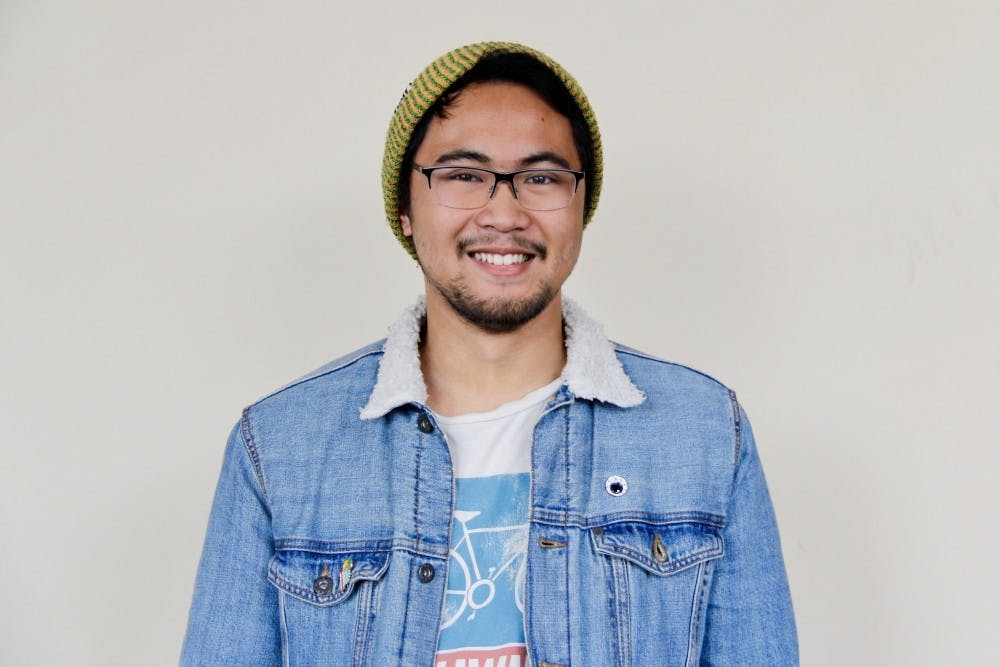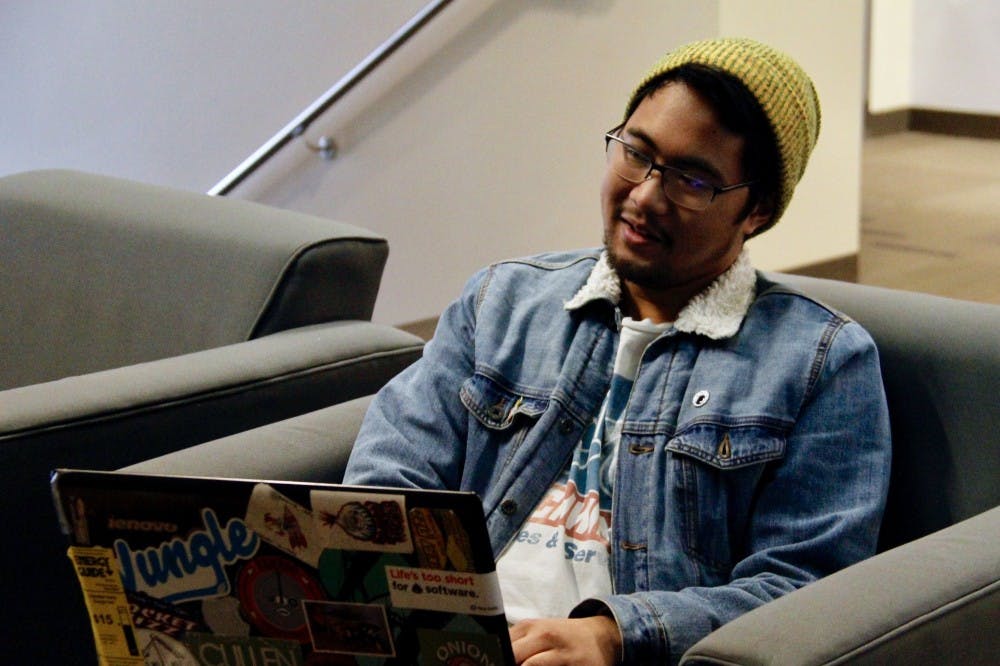Two computer science professors left the University of Portland at the end of last semester, causing some students concern that they won’t be able to complete their minors in the subject.
Mason Fredenberg, a sophomore theology major and computer science minor, is not entirely confident he’ll get his minor due to possibly not being able to register for upper-division classes.
“I think hiring on more staff would be a step in the right direction and being able to offer more classes...just more sections. I feel like they already have a broad range of class types, just the number of sections is very small,” Fredenberg said.
Computer science program chair Steve Vegdahl said that the minor is still available and that the Shiley School of Engineering has hired one person to replace one of the professors who left and is in the process of hiring for two more positions that will start in the fall.

Mason Fredenberg, a sophomore theology major and computer science minor.
Shiley School of Engineering program counselor Lindsay Chelton explained that UP guarantees students one major, but not two majors and/or a minor. In other words, though a minor is available, it is not guaranteed. She also explained that in the School of Engineering, registration for computer science classes is at first closed to non-majors. Once all of the computer science majors have been able to get into those classes, minors and those not in the computer science program can register for them.
“In terms of registration, our philosophy is all about equity and fairness,” Chelton said. “It’s more about making sure that computer science majors can get into the critical classes for their degree progress first before we fold in computer science minors.”
Chelton acknowledged that the registration process can be frustrating for students, especially because of the waiting period for non-computer science majors. She reiterated that Shiley wants to guarantee computer science classes to majors and wants to avoid having to remove students from a class once they have registered for it. Chelton noted though that the initial major-only restriction could discourage students.
“I think that that attitude (of it being exceedingly difficult to get into computer science courses) comes from when a student is online registering for courses and they see the restriction — then it feels like it’s impossible,” Chelton said.
Chelton and Vegdahl said that the computer science program as a whole has grown tremendously at UP in recent years, reflecting a national trend of the field’s increasing popularity. Computer science skills are practical in any discipline, and students nationwide are scrambling to register for courses. The surge has left computer science programs at schools big and small struggling to hire enough professors and offer enough courses so that students can graduate with a degree in the subject.
Though UP’s program has gained many students, Vegdahl said that he is unaware of any student who has not been able to complete a minor. However, he said that students could have become frustrated with maybe not getting the professor, section or elective they wanted and perhaps dropped the minor as a result.
“As far as I know, nobody has been prevented from completing their minor, but I know there are some who have been prevented from taking their first-choice course to complete their minor,” Vegdahl said.
The program also made sure that all courses had professors to teach them, Vegdahl said. The School of Engineering hired adjunct professors to teach some labs and hired a professor to replace one of the two who left. A professor from electrical engineering, Rajaa Alqudah, also began to teach some computer science courses to fill in for the other professor who left.
He said that in total, there are five computer science professors at UP this semester, not including Alqudah. The school is in the process of interviewing candidates to fill the sixth position vacated at the end of last semester and also searching for candidates for a newly-approved seventh position. Vegdahl said that in the fall, the plan is for there to be seven computer science professors and also have Professor Alqudah teach one course per semester.
However, the registration experience of some computer science students has made them doubt whether or not they will be able to complete their minors. Weslyn Nishimura, a senior mechanical engineering major and computer science minor, explained that she finds the skills she learns in computer science highly valuable. In the fall of 2017, when she registered for spring 2018 classes, she needed one more course to complete her minor.
She was unable to register for the two courses compatible with her prerequisites and schedule. She eventually registered for a course called parallel computing even though she did not have the prerequisites. After speaking with the professor and completing some paperwork with Associate Dean Mark Kennedy, she was able to register for the course and is on track to graduate with a minor.
“The professor has been very helpful,” Nishimura said. “(But) it’s definitely frustrating and lowered my opinion of the registration process.”
Chelton, the program counselor, explained that when a student takes a course without completing the prerequisites, like in Nishimura’s case, the program must formally document it for ABET, an engineering accreditation board. It makes sure that engineering programs across the country meet industry expectation, Chelton said.
“Those are pretty rare exceptions,” Chelton said. “We’re pretty strict about it because we want to maintain good standing with ABET and continue existing as a school.”
Alyssa Arnaud, a sophomore math major and computer science minor, is also unsure that she’ll complete her minor. She struggled to get into data structures, which is a prerequisite for all other courses for the minor.
But she also plans to graduate early, which means that she’s operating on a faster timeline. To increase her chances of getting into classes, she declared a computer science major, which she said that she may or may not keep. She said she was frustrated by what she perceived as the school’s lack of transparency.
“I feel like a big promise that the school made when you got here was that you’d be able to get into the classes that you need to take when you need to take them,” Arnaud said. “That’s why you go to private schools instead of state universities.”
Some other students with computer science minors have had different experiences with the registration process though. Noah Davis, a senior electrical engineering major with minors in math and computer science, said he loves the subject because he enjoys its challenges and problem-solving aspect.
He said that he was put on waitlists when registering for computer science classes, but that the experience didn’t cause him to worry too much. He did note though that he’s generally not anxious and said that he understands how it could cause more stress for others. Still, he said he thinks the school tries its best to accommodate students’ needs.
“I know that the Shiley School doesn’t guarantee you a minor, and you know that going in, that it’s technically not guaranteed, but I think they do their best making sure that everyone gets what they need,” Davis said.

Phillip Manalili, a senior electrical engineering major and computer science minor.
Phillip Manalili, a senior electrical engineering major and computer science minor, said he is fascinated by how computer science simply “works” right in front people’s eyes. He also praised UP’s computer science faculty for simplifying complex topics and showing genuine interest in students’ understanding of the material.
He said that being on a waitlist for a course last semester was stressful, but he eventually got into the class he needed.
“In retrospect, it (the registration process) makes sense,” Manalili said. “I’m definitely not mad anymore.”
Sarah Golder, a senior psychology major, had an indirect and later path to computer science. She will not graduate with a minor, in part because she declared it late, during her junior year. At the end of her sophomore year, she wanted to try a computer science course for fun, but she said that she was unable to register. By the second semester of her junior year though, she was in a computer science class. She was enjoying it and doing well, she recalled, which is when she thought about adding a minor.

Sarah Golder, a senior psychology major and computer science minor.
She said that she knew she would be unable to complete it without taking summer courses, but she nevertheless kept the minor until dropping it a few weeks ago. She also said that registering for computer science classes as a minor (rather than just as a student from the College of Arts and Sciences) increased her chances of getting into classes. Golder explained that she is not upset about graduating without a minor in the subject she loves.
“I don’t need to graduate with a minor to be able to say on a transcript or to potential employers, ‘I know Java, C, and I can work in Android Studio and Unix,’” Golder said. “I’m grateful that they let me in more than I’m (bitter) — I’m not even close to bitter about not having gotten in the first time around.”
Golder expressed though that she would like computer science to be made more available to the wider campus community. She hopes that making it more accessible, by adding faculty and more course sections, could perhaps help non-engineering students discover the same enthusiasm she has for the subject.
“If there were more people (faculty and students in the program) and the classes weren’t closed like they are (to non-computer science majors), then I wouldn’t have been intimidated as much by it. I wouldn’t even have needed to talk to Shiley. I would have just signed up because there are enough classes to suit as many people who want to try it,” Golder said.
Fredenberg echoed Golder’s sentiments and welcomed the prospect of Shiley hiring more faculty so that more students can discover computer science.
“I’ve had a lot of good experiences overall at UP, in so many different aspects, that the possibility of not getting my minor is such a small thing in comparison,” Fredenberg said. “I know that they’re trying to bring on new department members, which makes me think that the department would be big enough for me to be able to get the classes I want. So I’m cautiously optimistic (about completing my minor).”









